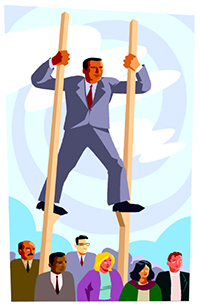Personal statements
"I'm unique just like everyone else"
Personal statements from the reader's point of view

It is surprisingly hard to think and write about yourself, so for many writers it can be helpful to think first about what readers want to learn from your personal statement and then about what you want to say about yourself.
The personal statement provides an opportunity for you to set yourself apart from the competition — to present yourself as an individual rather than a transcript or a test score. As a result, a strong personal statement emerges from your character and authentic experience.
However, many writers get caught up in talking about the experiences themselves and forget to explain what those experiences say about them and how they connect to the writer’s goals. In fact, the best way to show yourself as a qualified candidate for a program is by demonstrating mature and innovative thinking that comes, not from writing about the experiences themselves, but from the way you write about the effect these experiences had on you and the connections you draw between these experiences and your goals.
The following steps are designed to help you think about not only what you have done but also what that says about you and how that experience relates to your future program.
1) What?
This is brainstorming time. Think about all the experiences that may relate to what you are applying for, there are obvious ones (volunteering, academics) but any experience can serve as evidence of your thinking ability and your strength as an applicant. Even failures can be good learning experiences, so don’t ignore those because you think it will make you look like a weak applicant. Remember that it’s not about what you did but how you reflect on it.
- Volunteered at a clinic
- Worked while going to school
- Studied abroad
- Struggled through a class
2) Why?
Let’s face it, most applicants are going to have pretty similar experiences, so the key is how you interpret and consider those experiences. What does each experience show about you (your leadership, initiative, clarity of vision, etc.), and what impact did they have on you? What did you learn? What skills did you gain? How were you or your perspective changed? Remember, it’s not about what you did, but how you reflect on it.
Studying abroad in Spain made me realize how uncomfortable it is to speak a second language. I realized how much patience and encouragement I needed from others and myself.
3) How?
This is the really hard step. Now you must evaluate how your experiences relate to your application. How can you connect your skills, personality traits, perspectives, and learning to your desired position? Spell out for the reader why your interpreted experiences make you a qualified applicant. In other words, how does your past relate to your future?
The inadequacies I felt while speaking Spanish not only helped me learn how to deal with my own weakness but also helped me have more patience for others who need help. Such patience is essential in medicine because as a doctor I will be consulting people who may know nothing about the body.
4) Assembling the pieces
You will probably have multiple experiences you want to talk about in your statement, so you will repeat these steps more than once. As you interpret and evaluate each experience, also think about how these can be pieced together in order to present an accurate portrait of yourself. In other words, what claims can you make about yourself based on your experiences?
Plan on writing many drafts to get it right. Revision isn’t something that ought to be done — it has to be done.
Example of a partial personal statement
Over the last year, my experiences in and out of the classroom have solidified my commitment to become a dietitian. [makes a claim about the applicant] Last semester, for instance, my Medical Nutrition Therapy class merged science with practical application, [gives specific example of an experience to back up the claim] allowing me particular insight into how what I have learned can be applied to help others. [explains how the experience helped the applicant chose a profession] Our last case study of the semester [gives another specific example to further illustrate point] exposed us to nutritional problems associated with hepatic encephalopathy, and I was fascinated in the role a dietitian can play in intervention. [explains how the experience is connected to nutrition] After the class, I was eager for more occasions to learn, so I set up a three-day shadowing experience with two clinical dietitians. [gives specific example that demonstrates initiative and intellectual curiosity] The first case that the dietitian introduced me to was a 45-year-old woman with end stage liver disease and hepatic encephalopathy. Having the opportunity to connect the case studies I had read in class with this real and grave situation gave true relevance to the important work that dietitians do every day. [further explains how the experience led to the applicant’s view of nutrition] As the dietician wrote up the nutrition therapy order, she began to discuss the composition of the protein necessary for the treatment. Excited to apply what I learned in class, I blurted out, “We use branched chain amino acids because they are metabolized in the muscle and can improve nutritional status!” [demonstrates enthusiasm and ability to apply knowledge] I will never forget that experience because it was the moment when my future profession came to life. I knew I wanted to be a clinical dietitian.